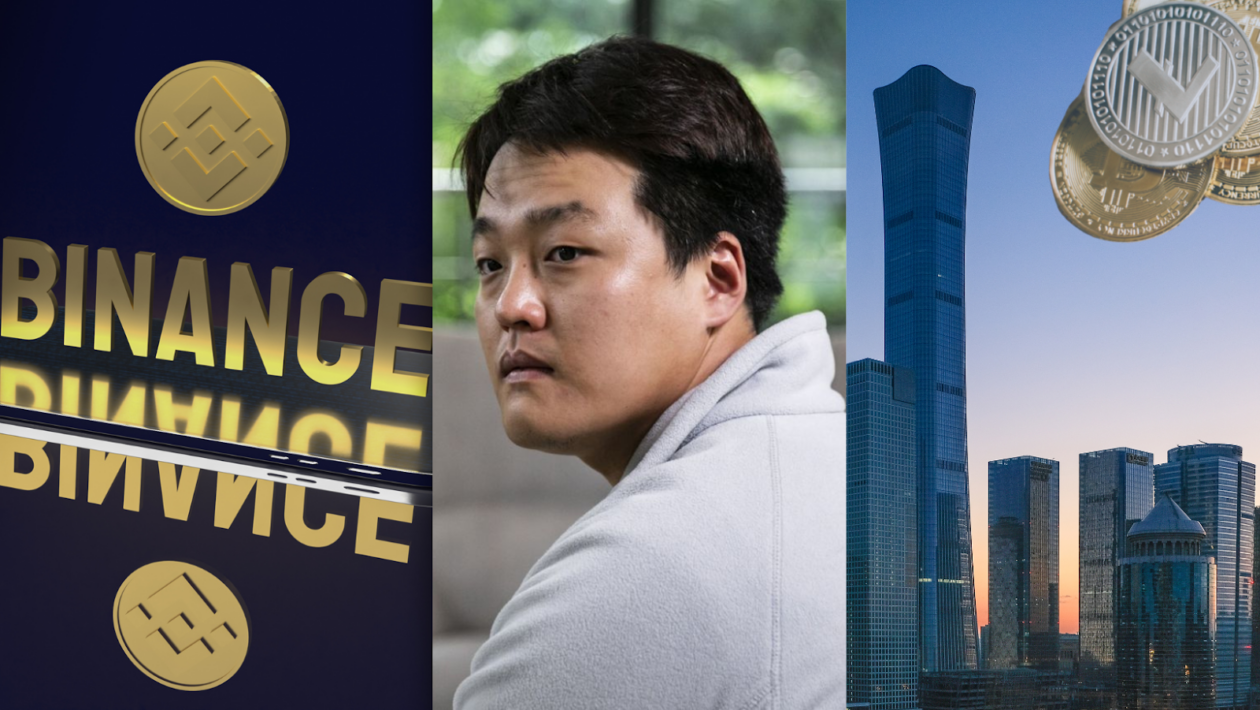In this issue
- Binance: In the dock
- Do Kwon: Journey’s end
- Hong Kong crypto: State-sanctioned
From the editor’s desk
Dear Reader,
It’s a rare thing when corporate spokespeople say much that could be considered interesting, let alone revealing. Yet that’s just what Binance’s communications folks have done following the news that the world’s biggest cryptocurrency exchange is being sued for allegedly breaking U.S. law.
In a statement responding to the lawsuit the U.S. Commodity Futures and Trading Commission has brought against Binance and its co-founder, Changpeng “CZ” Zhao, over alleged breaches of the Commodity Exchange Act and CFTC regulations, the company called for the development of a “clear, thoughtful regulatory regime.”
So far, so bland, right? Perhaps. But in arguably the world’s most litigious country, the law must be nothing if not clear. And when it comes to finance in the home of the world’s deepest and most liquid capital markets, things don’t get much more crystal than the rules and regulations.
And as it happens, this comes in the same week that another U.S. agency, the Securities and Exchange Commission, filed a Wells notice to crypto exchange Coinbase, signaling that enforcement action is coming. Coinbase is apoplectic, and its frustration is summed up simply in a tweet posted by its chief legal officer, Paul Grewal, who said: “After years of asking for reasonable crypto rules, we’re disappointed that the SEC is considering courts over constructive dialogue.”
Binance’s call for regulatory clarity is unassailable, as is Coinbase’s, and it’s representative of a view shared across the rest of the crypto industry as it struggles to emerge from the shadow of last year’s traumatic busts and blowouts.
Whether the CFTC’s allegations hold up or not, Binance has a colorful history when it comes to regulation and compliance. Yet the exchange’s move late last year to set up a recovery fund for distressed crypto assets — quibbles over its size aside — was an admirable gesture that appeared to signal a new determination on its part to get on the right side of things. As was Binance’s announcement last summer that it would establish a global headquarters and a transparent, professional management structure.
But perhaps these were all well-strategized moves to counter potential earlier missteps in this game of regulatory chess. And that continues to play out. Many pieces have fallen. Following the enormous sense of betrayal the crypto industry has been saddled with by fellow crypto-kingpin Sam Bankman-Fried, there is a political tailwind to the actions of the CFTC and SEC this week.
But until the judge’s gavel falls, it seems that the crypto industry is in for yet more soul-searching as it seeks sturdier ground. Internationally, regulators are taking notice too. This game of chess is a global one, and we await the next move.
Until the next time,
Angie Lau,
Founder and Editor-in-Chief
Forkast
1. Risky business

By the numbers: Binance — over 5,000% increase in Google search volume.
The U.S. Commodity Futures Trading Commission has sued Binance, the world’s largest crypto exchange, and its co-founder and chief executive, Changpeng Zhao for allegedly illegally offering unregistered cryptocurrency derivatives in the U.S.
- The CFTC filed a civil enforcement action on Monday accusing Binance and Zhao, also widely known as “CZ,” with alleged violations of the Commodity Exchange Act and CFTC regulations. Samuel Lim, Binance’s former chief compliance officer, was also sued for allegedly aiding and abetting Binance’s violations.
- “Since the launch of its platform in 2017, Binance has taken a calculated, phased approach to increase its United States presence despite publicly stating its purported intent to ‘block’ or ‘restrict’ customers located in the United States from accessing its platform,” the complaint said.
- Crypto exchanges must register with the CFTC before providing crypto derivative services in the U.S., but Binance did not do so. In August 2020, Binance earned US$63 million in fees from derivatives transactions, and around 16% of its accounts were held by customers located in the U.S., according to the CFTC.
- Binance and its staff stand accused of evading CFTC regulation on purpose through measures such as instructing U.S. customers to obscure their locations with virtual private networks and intentionally structuring their entities and transactions to avoid registration requirements, according to the CFTC.
- Through the litigation, the CFTC is seeking monetary penalties, permanent trading and registration bans, and an order to prevent Binance from violating the Commodity Exchange Act and CFTC regulations.
- Zhao tweeted the number “4” on Monday in response to the CFTC’s accusations, a reference to a Jan. 2 tweet in which he said “4” meant “ignore FUD” — fear, uncertainty and doubt — “fake news, attacks, etc.”
- Binance later responded to the CFTC in a blog post in which Zhao claimed the regulator’s complaint “appears to contain an incomplete recitation of facts” and that Binance would “continue to respect and collaborate with U.S. and other regulators around the world.”
- Binance has faced mounting regulatory challenges in the U.S. Prior to the CFTC complaint, the exchange was probed by the Justice Department over potential anti-money-laundering law infractions and by the Securities and Exchange Commision over suspected sales of unregistered securities.
- In February, Binance corporate partner Paxos Trust was ordered by U.S. authorities to stop issuing the Binance USD stablecoin after it was identified by the SEC as an unregistered security.
- BNB, Binance’s native token, was trading at US$318.11 midweek in Asia, down more than 3% from a daily high of US$329.33 on Monday, according to data from CoinGecko.
Forkast.Insights | What does it mean?
Changpeng Zhao described the filing of a lawsuit by the CFTC against Binance as “unexpected,” but the regulator has been probing his crypto exchange since 2021.
The CFTC has been investigating whether Binance has sufficient measures in place to keep U.S. residents from buying and selling crypto derivatives. CFTC rules generally require platforms to register with it if they let Americans trade such products. Binance has, for years, seemed unwilling to comply, and the CFTC says the exchange has made millions of dollars by doing so.
The regulator has also accused Binance of not doing enough to combat money laundering. According to CFTC’s complaint, since at least last May, Binance had not filed a single suspicious activity report in the U.S. For an industry in which such activity is rife, it seems odd that the world’s biggest exchange wouldn’t have been a conduit for at least some shady money.
The CFTC can’t bring criminal charges against firms or seek jail time for individuals, but it can further damage the reputation of an exchange that has thus far managed to shrug off a lot of lawsuits as well as consternation by other regulators.
2. Lost and found

By the numbers: Do Kwon — over 5,000% increase in Google search volume.
Kwon Do-hyung, co-founder of collapsed Terraform Labs, has been arrested in the Balkan nation of Montenegro, more than six months after Interpol issued a red notice for the wanted crypto entrepreneur. Do Kwon, as he is better known, is facing multiple charges by authorities in the U.S., South Korea and Montenegro, and possible extradition.
- Do Kwon, alongside Han Chang-jun, the former chief executive of Terra-affiliated Chai Corporation, was arrested by the police at an airport in Montenegro last Thursday, allegedly traveling on forged documents, South Korean police told Forkast.
- Following Do Kwon’s arrest, U.S. prosecutors issued an indictment for him on eight charges, including securities fraud, commodities fraud and conspiracy, according to a Bloomberg report. He has also been charged by the U.S. Securities and Exchange Commission with alleged crypto asset securities fraud.
- Terraform Labs was behind the collapse of the Terra-Luna stablecoin last May, which wiped out an estimated US$40 billion, affecting around 280,000 investors in South Korea alone. South Korean authorities issued an arrest warrant for him last September, and his whereabout had been largely unknown until now.
- Both the U.S. and South Korea are seeking Do Kwon’s extradition. A court in Montenegro will hold an extradition hearing after it makes a decision on his forgery charges, according to a report by AFP.
- Since Do Kwon was detained, South Korean prosecutors have been making renewed efforts to arrest Terraform Labs co-founder Shin Hyun-seung, also known as Daniel Shin, according to a Bloomberg report. Shin is said to have cut ties with Do Kwon in 2020 and has been cooperating with South Korea’s investigation of the Terra-Luna collapse.
- South Korean prosecutors sought in November 2022 to detain Shin, who allegedly earned as much as US$100 million from the Terra-Luna debacle, but they failed to convince a court to issue an arrest warrant.
Forkast.Insights | What does it mean?
Do Kwon’s arrest is noteworthy for many reasons. His detention is not only a victory for law enforcement but it represents a significant change in how authorities regard crypto crime.
At the time, the collapse of Terra’s token was chalked up as indicative of the inherent flaws of algorithmic stablecoins, and the technology was pilloried as the reason why so much money was lost.
But thanks to the persistent efforts of law enforcement agencies, that narrative is now changing. One part of the history being rewritten concerns the role FTX and affiliated companies may have played in breaking the Terra-Luna relationship for profit.
The other, and the reason for Do Kwon’s arrest, is how he and others allegedly managed to siphon billions of dollars from investors while propping up liquidity, in addition to developers’ apparent concealment of vulnerabilities in the project’s code.
The wheels of justice may seem to turn slowly for those accused of crypto crimes, but law enforcement’s increasing cooperation with each other internationally has quickly ended Do Kwon’s run.
3. Over the Great Crypto Firewall

A number of Chinese state-owned banks’ Hong Kong branches have started offering services to local cryptocurrency companies, according to a Bloomberg report, as the city welcomes a growing list of cryptocurrency and digital asset firms looking to expand or relocate there.
- The Hong Kong entities of Bank of Communications, Bank of China and Shanghai Pudong Development Bank have begun to offer services to local crypto firms or have made inquiries about doing so, according to the report.
- Companies in Hong Kong’s crypto industry frequently had difficulty setting up corporate bank accounts, and the moves by the state-owned lenders reflect China’s backing of the city’s digital asset industry, the report said.
- In September 2021, China banned cryptocurrency transactions within mainland Chinese borders, but Hong Kong has continued to be the home base for many companies in the sector. Last October, Hong Kong released policy documents embracing the sector, aiming to regain its position as an international hub for digital assets and Web3 companies.
- More than 80 foreign and mainland Chinese companies have expressed interest in establishing operations in Hong Kong, ahead of new crypto regulations that will take effect in June, Christopher Hui, Hong Kong’s Secretary for Financial Services and the Treasury, said last week.
- Hong Kong Financial Secretary Paul Chan said last month that the government was setting aside HK$50 million (US$6.37 million) to develop the sector, which he called a “golden opportunity” to lead innovative development.
- Meanwhile, in mainland China, the legal status of cryptocurrencies is still under discussion, despite the country’s ban on crypto trading. The Chinese Procurators, a state-run legal magazine, published an opinion piece on March 20 advocating that cryptocurrencies should be identified as property under the country’s criminal law and thus protected from infringements.
Forkast.Insights | What does it mean?
Crypto’s speculative nature and enormous energy consumption — not to mention its ability to move large amounts of money outside of government control and monitoring — made China sufficiently nervous to ban all crypto mining and crypto transactions in September 2021. However, Chinese authorities now appear to see the upside of crypto development, with Hong Kong publishing a series of policy documents to oversee the growth of the crypto sector in the city.
Now that Chinese state-owned banks are voicing support for a growing number of crypto firms in need of corporate bank accounts, startups in the city may gain easier access to banking services. The Chinese banks’ moves could fill the void left by the collapses of crypto-friendly U.S. banks Silicon Valley Bank, Silvergate Capital and Signature Bank.
Chinese officials, including representatives from China’s Hong Kong Liaison Office — Beijing’s representative outpost in the city — have been spotted mingling with local crypto industry figures at events in Hong Kong, Bloomberg reported last month, another sign that Beijing has given its blessing to Hong Kong’s crypto push.
It’s becoming increasingly clear that China intends to develop its Web 3.0 industry, deploying all kinds of enterprise blockchain and government infrastructure projects while confining all things crypto to Hong Kong, a special administrative region that runs its own economy according to free market principles. As Hong Kong’s new licensing regime for virtual asset trading platforms comes into effect later this year, the city may find itself in the enviable position of returning to its former glory as a crypto hub while underscoring assurances to investors and company founders that Hong Kong’s political overlords will not interfere.




